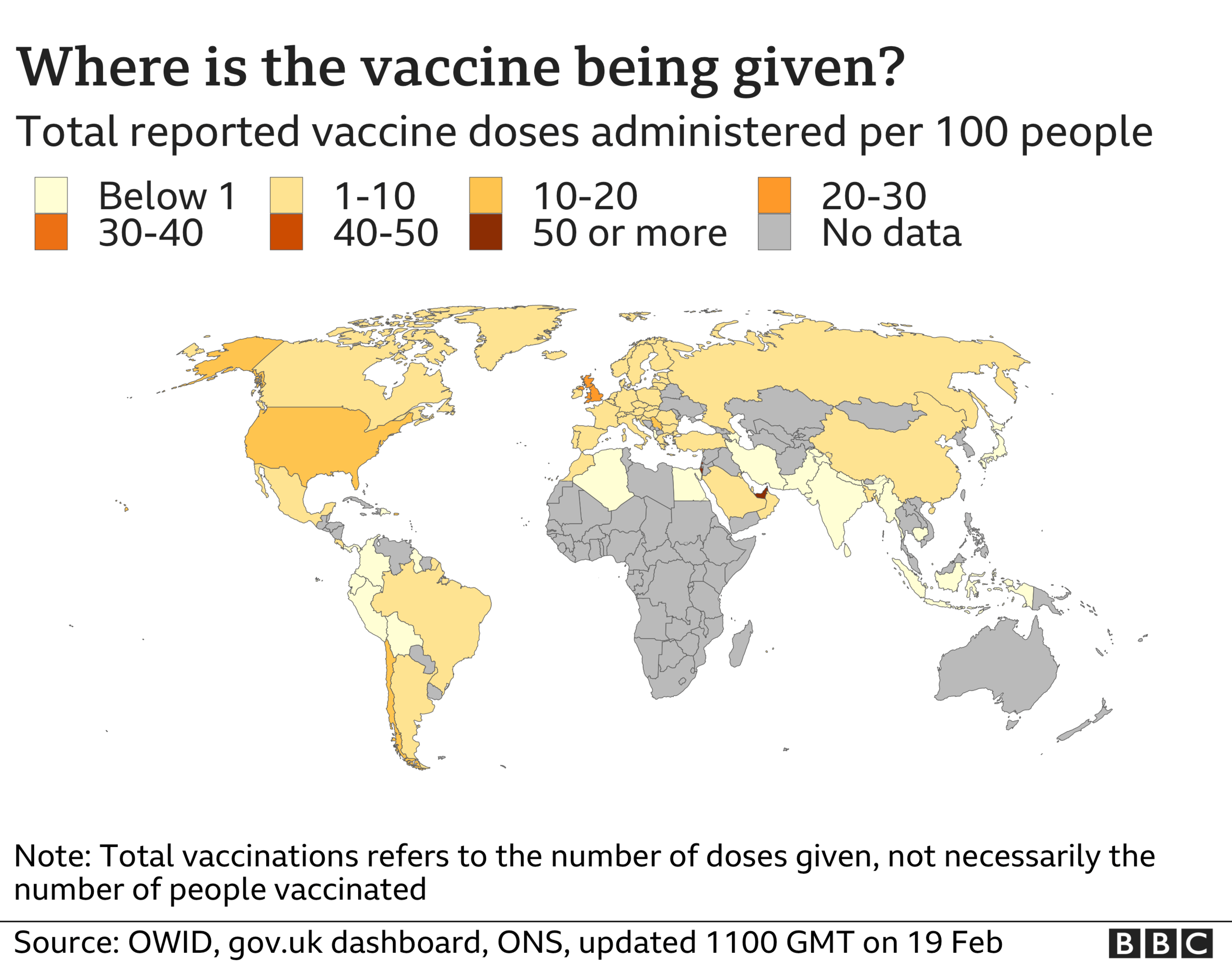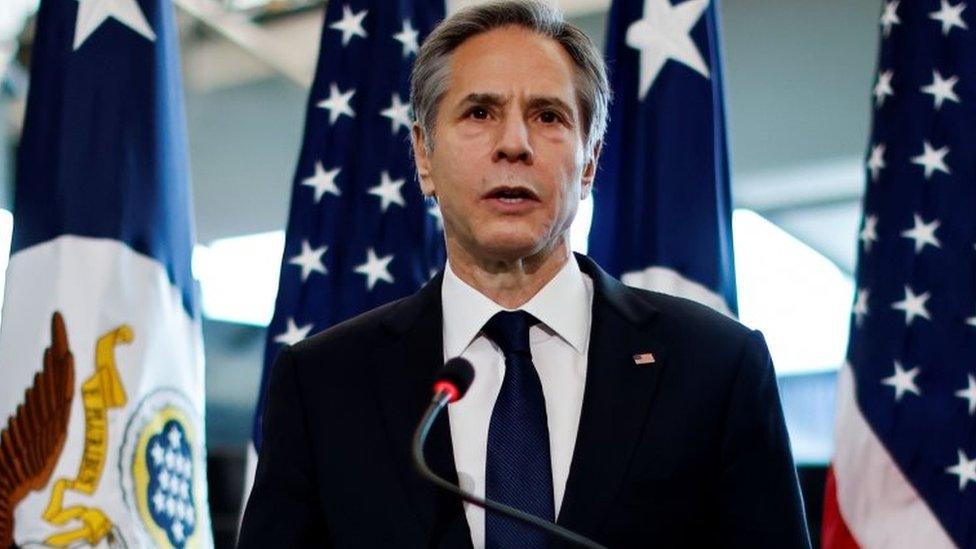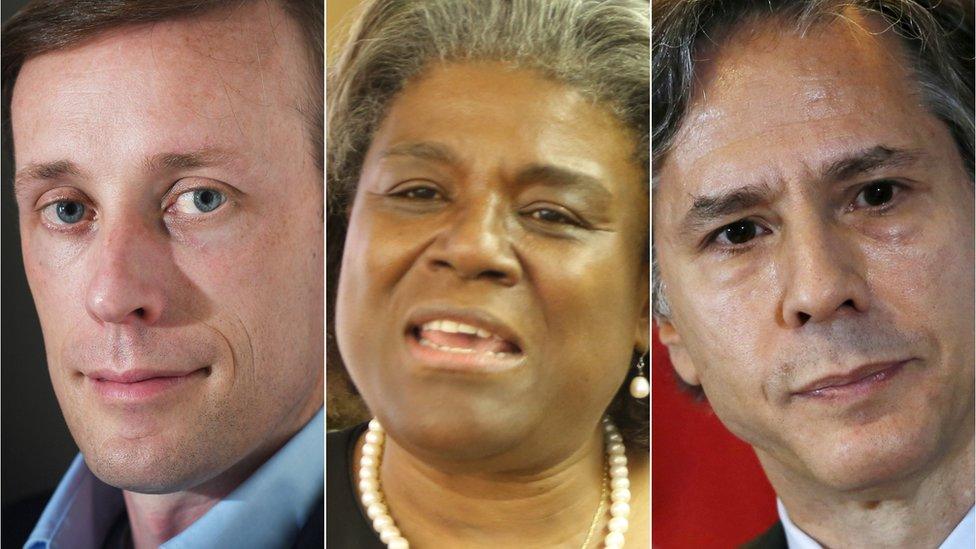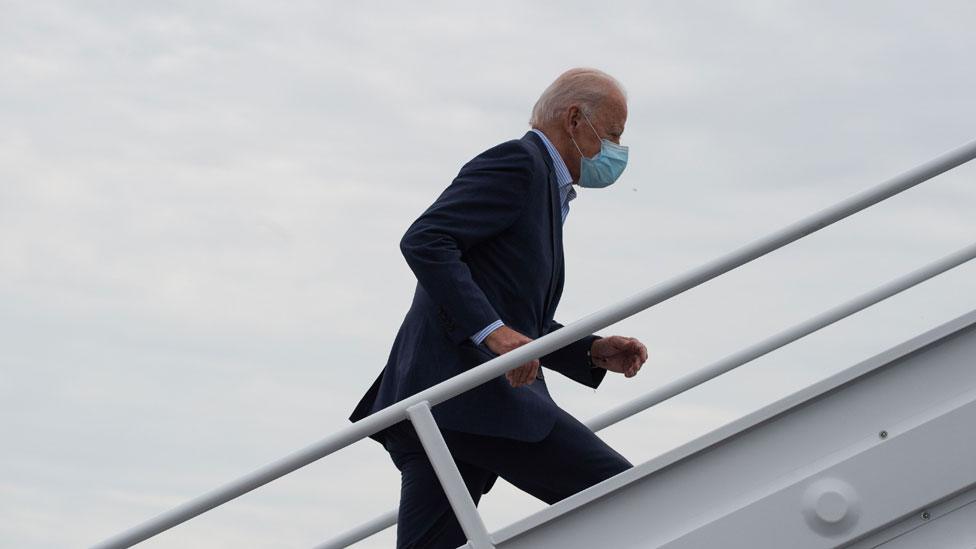America is back, US Secretary of State Antony Blinken tells BBC
- Published
US Secretary of State Antony Blinken: "We're determined to engage with the world"
"America is back" and is fully engaged in helping resolve issues including the pandemic, climate change and Iran's nuclear ambitions, US Secretary of State Antony Blinken has told the BBC.
In his first international interview, Mr Blinken stressed the importance of worldwide vaccination against Covid-19.
He also criticised China for its lack of transparency in uncovering how coronavirus emerged.
It marks a break with the "America First" policy of Donald Trump.
Mr Blinken was speaking as the leaders of the G7 richest industrialised nations met in virtual session.

When Blinken speaks, he speaks for the president
By Yalda Hakim, BBC News
The last four years with Donald Trump in charge, it has been all about America first. But what does the US now stand for in the world with Joe Biden as President?
In his first international broadcast interview, I've been speaking to Secretary Blinken about what role Washington can play in resolving conflicts and navigating a path out of the coronavirus pandemic.
Blinken has been Biden's top foreign policy advisor for nearly two decades. He has also served as deputy secretary of state.
Arguably, not since James Baker under the first President Bush has a Secretary of State entered office with so close a relationship with the president.
This is what distinguishes Antony Blinken from Colin Powell, Rex Tillerson or Hillary Clinton. None of these people knew the President deeply. None of them had worked for the president previously.
When Antony Blinken speaks, he speaks for the president.
He is a consummate foreign policy insider and like his boss he is also someone with a reputation for his civility and graciousness.
Blinken has had a front row seat to history over the past 30 years and now he's been tasked by the president to re-frame America's relationship with the world.
At the centre of the Trump Administration's approach was great power competition. For Obama it was restraint. For Bush it was the war on terror. I asked Blinken what the Biden Administration's foreign policy bumper sticker was. He smiled and without hesitation said "American engagement, American leadership".

What did Blinken say about vaccinations?
The US is giving $4bn (£2.85bn) to the Covax vaccination scheme, which aims to deliver more than two billion doses to people in 190 countries in less than a year.
"Unless and until everyone in the world is vaccinated, then no-one is really fully safe, because if the virus is out there and continuing to proliferate, it's also going to be mutating," Mr Blinken said.
"And if it's mutating, it's also going to come back and bite people everywhere."
The US has now vaccinated more than 27 million of its own people. However, in many poorer countries, vaccination has yet to begin.


Mr Blinken also accused China of failing to share information that might shed light on the origins of coronavirus.
A team of investigators from the World Health Organization (WHO) spent four weeks in China on a fact-finding mission at the beginning of 2021. However, two experts from the WHO team said afterwards that China refused to grant full access to the data they sought.
The secretary of state said a better health security system was needed to spot pandemics before they fully emerged.
"It requires countries to be transparent. It requires them to share information. It requires them to give access to international experts at the beginning of an outbreak - things that unfortunately we haven't seen from China," he said.
Did Blinken signal a change of tack on Iran?
Yes. Under Donald Trump, the US left the deal under which world powers eased crippling economic sanctions, in return for limits on sensitive activities to show it was not developing nuclear weapons.
Now the US is examining whether to rejoin the deal. President Biden said on Friday that the US must work with other major powers to rein in what he called Iran's "destabilising" nuclear ambitions.
For its part, Iran says that despite an EU offer to broker talks with the US to revive the deal, the US "must act" first and lift sanctions.
Mr Blinken told the BBC the US and its European partners were "once again on the same page" on Iran.
"President Biden has been clear for some time: if Iran returns to its obligations under the nuclear agreement, the United States will do the same thing," he said.
And he said the US would then work with other countries to confront Iran on other issues, including its influence in the region and its ballistic missile programme.
Asked by the BBC's Yalda Hakim how he would respond to accusations that the US had made concessions to Iran, he said the previous approach had failed.
"We have a policy in recent years of so-called 'maximum pressure' on Iran that has not produced results. In fact, the problem has gotten worse. Iran is now much closer to being able to produce, on short order, enough fissile material for a nuclear weapon."
On human rights and Princess Latifa
Mr Blinken was also asked about the case of Princess Latifa, the daughter of the ruler of Dubai, who has accused her family of holding her hostage since she tried to flee in 2018.
In the secretly recorded videos, obtained by the BBC, the princess said she feared for her life. The story has prompted global calls for a UN investigation and the UN human rights agency has asked the United Arab Emirates (UAE) to provide proof that the princess is still alive.
The US secretary of state said that the US would be closely monitoring the situation, adding: "Across the board, with adversaries, competitors, with partners and allies alike.. we take human rights seriously and the president has put it at the heart of our foreign policy and countries can expect us to follow through on that."
On Friday, Dubai's royal family said via the UAE's London embassy that Princess Latifa was "being cared for at home".
But there was no video or photo released with the family's statement which could serve as proof of life, nor did it give any details about her condition.
What else is in Blinken's agenda?
The Americans are currently reviewing their policy on Afghanistan to decide whether or not to keep troops there. Mr Blinken said the US and others would be putting pressure on the Taliban and others to honour their commitments to disassociate themselves from al-Qaeda.
He described the recent military coup in Myanmar as "a tragic setback to what had been a historic democratic transition".
He condemned China's decision to block BBC World News television and World Service radio, calling the Chinese information space "one of the least open" in the world.
"China uses that to spread misinformation and propaganda... I think ultimately is unsustainable and it requires countries coming together to stand up for free and open information space and we are looking at ways to do that more effectively," he said.
Mr Blinken refused to be drawn on calls for a boycott of the 2022 Winter Olympics, due to be held in Beijing, over allegations of genocide against the Uighur minority, saying only: "That's something we'll come to at the right time, in the right moment."
Related topics
- Published28 January 2021

- Published24 November 2020

- Published7 November 2020
